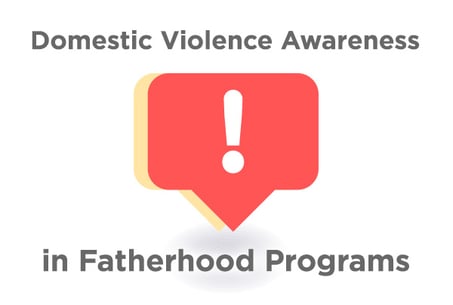How Well Do Fatherhood Programs Integrate Domestic Violence Awareness and Education?
3 min read
Date Published: 04/28/2020
Last Updated: 04/26/2023
National Fatherhood Initiative Blog / Latest Articles
3 min read

One of the primary concerns that has arisen during the COVID-19 pandemic is the reported surge worldwide in domestic violence as perpetrators and victims of domestic violence are forced to shelter-in-place together.
A related concern that has dogged responsible fatherhood programs is a failure to adequately raise awareness about and educate dads on domestic violence. As a result, an increasing number of public and private funders have required the fatherhood programs they fund to integrate such awareness and education. Some funders have also required the implementation of domestic violence protocols to identify potential and actual cases of domestic violence.
So, what exactly have fatherhood programs done with the dads they serve in this regard?
The short answer?
Until recently, we didn’t know.
Fortunately, two recent federally-funded studies of the U.S. Department of Health and Human Services answered that question. (You can find links to both studies at the end of this post.) Even though the researchers that led both studies did not collaborate, the research designs and some findings were remarkably similar.
Research Designs
Both studies employed a qualitative research design in which the researchers:
One of the studies also included on-site observation of fatherhood programs.
Both designs acknowledged that fathers can be perpetrators and victims of domestic violence.
Findings: Variability and Diversity
Both studies found variability in the level at which fatherhood programs address domestic violence (DV). The studies also found diversity in the ways in which programs address DV. Researchers in one of the studies found, for example, that the federally-funded programs they examined with requirements to address DV had a more comprehensive and holistic approach to DV than did the non-federally funded ones.
Nevertheless, both studies’ findings paint a positive picture of the progress of fatherhood programs addressing DV. (For ease of communication, I took liberty in paraphrasing and combining results from both studies, and in which findings to include here.)
Barriers and Recommendations
Despite the good news about the progress of fatherhood programs in addressing DV, there remain personal, organizational, systemic, and cultural barriers to the integration of DV that must be addressed if this progress is to continue. Fatherhood programs alone cannot address all of them.
At the same time, fatherhood programs can do more. Both studies include recommendations that fatherhood programs can implement to improve their individual progress and, as a result, the collective progress that's so important.
To learn more about the barriers and recommendations, I encourage you to download and read the reports.
How well does your fatherhood program integrate DV awareness and education?
Did you know that National Fatherhood Initiative® (NFI) has a supplemental booster session that specifically addresses DV? It’s used by fatherhood programs across the country as their primary DV awareness and education tool. It’s called Understanding Domestic Violence. Click here to learn more about it and to acquire it.
To download both studies, click on the embedded links below.
Karberg, E., et al. (2020). Preventing and Addressing Intimate Violence when Engaging Dads (PAIVED): Challenges, Successes, and Promising Practices from Responsible Fatherhood Programs. Washington, D.C.: U.S. Department of Health and Human Services.
Thomas, K., and Mederos, F. (2020). Responsible Fatherhood Groups and Domestic Violence Education: An Exploratory Study of Current Practices, Barriers, and Opportunities. Washington, D.C.: U.S. Department of Health and Human Services.
*Both studies included a review of the curriculum of NFI’s 24/7 Dad® program. One of the studies included a review of the curriculum of NFI’s Understanding Domestic Violence booster session that organizations integrate into fatherhood programs.
Date Published: 04/28/2020
Last Updated: 04/26/2023
Download this free guide for a proven 7-step roadmap—from making the case and securing funding for your program, to launching and measuring real results!


Train Your Staff
Fatherhood Programs
Fatherhood Data
© 2026 National Fatherhood Initiative®. All rights reserved.